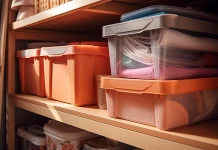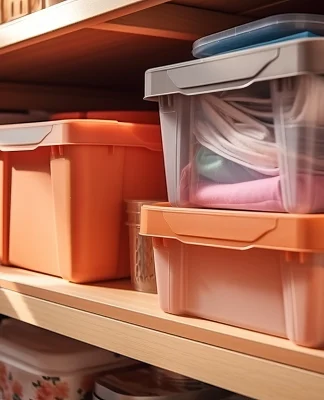 If you’re an avid reader, there’s one thing you shouldn’t sacrifice: high-quality storage for your books. If not taken care of properly, books can weather, fall apart and become unreadable. If you’re someone who takes pride in his or her book collection, you know how detrimental this can be. However, as your book collection continues to grow, it’s easy to run out of space to store them in your home. Books take up a lot of room, and while having an extravagant library is every bookworm’s dream, sometimes it’s not plausible. Books are fragile, they need a space they can breath without falling apart. That’s why we’ve put together an article on the best ways to store your books with some advice from the experts.
If you’re an avid reader, there’s one thing you shouldn’t sacrifice: high-quality storage for your books. If not taken care of properly, books can weather, fall apart and become unreadable. If you’re someone who takes pride in his or her book collection, you know how detrimental this can be. However, as your book collection continues to grow, it’s easy to run out of space to store them in your home. Books take up a lot of room, and while having an extravagant library is every bookworm’s dream, sometimes it’s not plausible. Books are fragile, they need a space they can breath without falling apart. That’s why we’ve put together an article on the best ways to store your books with some advice from the experts.
Before we dive into how to store your books, we wanted to take a second to remind you that washing your hands before handling your books will do wonders for their shelf life. The oils on our hands and in our skin can damage books and cause premature deterioration. If you have any rare books, we advise you to wear latex gloves when handling them to make sure that they last well past the years you own them.
Rule #1: Avoid Humidity
If you’ve ever tried to hold a piece of paper in a humid environment, you understand the problem. Humidity seeps into the pores of paper and is a recipe for disaster. Whether you opt to store your books in your home, in a storage unit, or in a library, you need to avoid humidity at all costs. Humidity will wreak havoc on your books and more often than not, render them completely unreadable. Humidity breeds mold and mildew, both of which will quickly reduce the shelf life of your favorite fictions. If you end up with mold or mildew on your books, there’s not much you can do. Experts recommend that if this happens, the main thing you should do is separate it from the rest of your collection so the rot doesn’t spread.
There is a small possibility that freezing your book may help. If your book has recently been exposed to moisture, humidity, or water in general, put it in the freezer. This is a weird concept to consider, but when you put your book into the freezer the pages may have a chance to be salvaged. If you’ve purchased your from a typical bookstore and the resale value isn’t very high, ask yourself if it’s worth the hassle. Usually, it’s not. Go ahead and toss the book and head back to buy another one. However, if you have a rare first or second edition, or if your book holds sentimental value, take the frozen pages over to an expert. Wet pages are much easier to handle than pages that have already been filled with mold.
To avoid any of these problems, it’s best to make sure your books are stored somewhere that has no chance of being exposed to excess moisture or water. One of the best places for this is a climate controlled self storage unit. If you have hundreds of books, consider renting one out, putting in your favorite bookshelf, and creating an easy to manage and safe new home for your books.
Rule #2: Stick to Plastic Bins or Boxes
I f you don’t want to pack your books into a bookshelf, or aren’t trying to display them while they’re being stored away, it’s easy to use boxes. Just remember, paper attracts humidity and when you’re storing things primarily made of paper, it’s best to avoid taking any risks. This is why experts recommend storing your books in plastic bins or boxes instead of paper ones. Not only will they reduce the chances of being destroyed, plastic bins will protect your books from any external circumstances. They block out water, dirt, pests, and, when you opt for airtight containers, outside humidity. If you’re putting away your books for a long time, this is your best possible option.
f you don’t want to pack your books into a bookshelf, or aren’t trying to display them while they’re being stored away, it’s easy to use boxes. Just remember, paper attracts humidity and when you’re storing things primarily made of paper, it’s best to avoid taking any risks. This is why experts recommend storing your books in plastic bins or boxes instead of paper ones. Not only will they reduce the chances of being destroyed, plastic bins will protect your books from any external circumstances. They block out water, dirt, pests, and, when you opt for airtight containers, outside humidity. If you’re putting away your books for a long time, this is your best possible option.
Once you put your books into plastic bins or boxes, you can choose to store them either in your home or in a self storage unit. If you have enough room in your home, that’s great. Unfortunately chances are that if you need to put them in plastic bins or boxes, you don’t have enough room to keep them at home. Luckily, self storage units are great alternatives that allow you an easy way to access your books any time of the day while keeping them safe from harm.
Rule #3: Always Store Books Vertically
 Whether you choose to store your books on a bookshelf or in a plastic bin, there’s one thing you should always remember. Never, ever, store your books by stacking them on top of each other. Too much weight will end up breaking them. Their spine will crack or roll and the pages will end up coming apart. To combat this type of damage, store your books vertically so that there’s no extra weight added on top. The less pressure you put on a book, the better. Books are fragile; they’re hundreds of pages wound together by a thin string then glued to a cover. When you apply an unnecessary amount of pressure on them, especially for a prolonged period of time, it’s no surprise that they begin to unwind.
Whether you choose to store your books on a bookshelf or in a plastic bin, there’s one thing you should always remember. Never, ever, store your books by stacking them on top of each other. Too much weight will end up breaking them. Their spine will crack or roll and the pages will end up coming apart. To combat this type of damage, store your books vertically so that there’s no extra weight added on top. The less pressure you put on a book, the better. Books are fragile; they’re hundreds of pages wound together by a thin string then glued to a cover. When you apply an unnecessary amount of pressure on them, especially for a prolonged period of time, it’s no surprise that they begin to unwind.
Rule #4: Avoid Direct Heat
Similarly to how you want to avoid overly humid areas, you need to avoid storing your books in any area that gets direct heat. This means keeping your collection away from heat ducts, furnaces, or any other type of hot appliance. Applied heat over time leads to warping and in extreme conditions, house fires. Avoid direct sources of heat for the best book storage conditions. While sunlight might not be a direct source of heat inside your home, it can still raise the temperature of books and, in extreme cases, may even cause them to bleach. Avoid harsh, direct sunlight for the best way to store books in storage.
Rule 5: Display Them With Pride
 The best way to ensure that your books are stored safely is to display them with pride. Keeping them in your home, vertically stored, on an open-air bookshelf will give you the best conditions for regular, every day book storage. The problem is that most people who love to read also hate to get rid of their books. Instead, they want to display them for their friends and family to see. If you have too many books to display, we recommend picking your absolute favorites and creating a storage unit in your home. A typical bookshelf will do, but don’t try to over-cram it. If you find that you have too many books to store in your home, don’t be afraid to put some away. It’ll be better for you and your collection in the long run.
The best way to ensure that your books are stored safely is to display them with pride. Keeping them in your home, vertically stored, on an open-air bookshelf will give you the best conditions for regular, every day book storage. The problem is that most people who love to read also hate to get rid of their books. Instead, they want to display them for their friends and family to see. If you have too many books to display, we recommend picking your absolute favorites and creating a storage unit in your home. A typical bookshelf will do, but don’t try to over-cram it. If you find that you have too many books to store in your home, don’t be afraid to put some away. It’ll be better for you and your collection in the long run.
Rule 6: Find a Conservator
 If you own extremely rare editions of certain books, it’s best to not take any chances. To make sure that your books are kept in the best condition possible, and maintain a high value, find a conservator. A conservator will help make sure that you take the utmost care for your books and, if necessary, will help you find an appropriate book collector, museum, or library for any books that you want to store professionally. For example, you can opt to donate your books to the American Institute for Conservation (AIC) if you’re looking for a good home for your books.
If you own extremely rare editions of certain books, it’s best to not take any chances. To make sure that your books are kept in the best condition possible, and maintain a high value, find a conservator. A conservator will help make sure that you take the utmost care for your books and, if necessary, will help you find an appropriate book collector, museum, or library for any books that you want to store professionally. For example, you can opt to donate your books to the American Institute for Conservation (AIC) if you’re looking for a good home for your books.
Regardless of what types of books you love to read, it’s more important than ever to keep them safe. In a world that’s migrating towards digital media, book lovers know and understand the importance of preserving their literature. If you want to keep your library in good condition for years to come, make sure you have a good self storage unit that you can turn to. Keeping your book collection in a self storage unit is the best way to ensure it stays in pristine condition. You just need to make sure you find a self storage company you can trust.
The professionals at The Lock Up Self Storage are here to help. The Lock Up Self Storage has a wide variety of storage units that range from small to large and everywhere in between. Regardless of the size of your book collection, we have something for you. To make sure your books are kept in the best condition possible, all of our storage units are climate controlled and secure. Each of our locations is equipped with perimeter alarms, gated access, individual access codes, and 24/7 video monitoring. The Lock Up gives you access to your unit at any time, day or night, so you can read your favorite book whenever you want. With our flexible leasing options, your collection has no limitations. Give us a call today to learn more about our available units and talk to one of our storage specialists. You can reach us at (866) 327-LOCK.



















